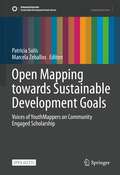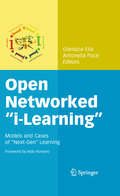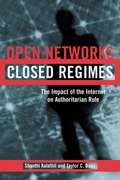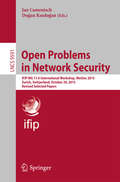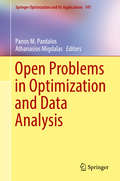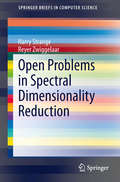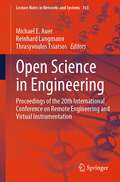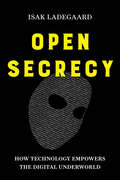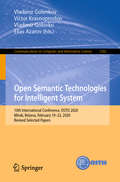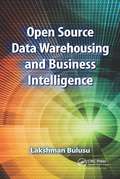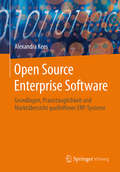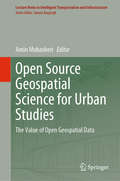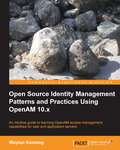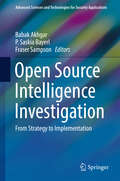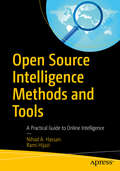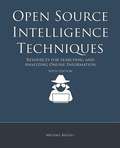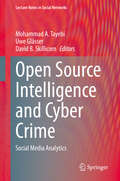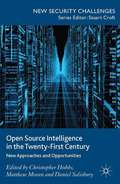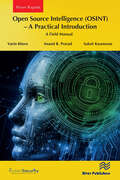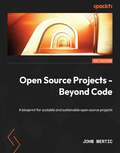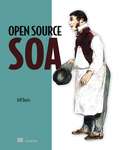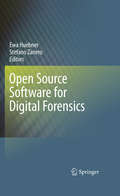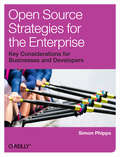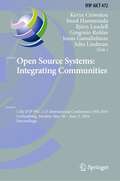- Table View
- List View
Open Mapping towards Sustainable Development Goals: Voices of YouthMappers on Community Engaged Scholarship (Sustainable Development Goals Series)
by Patricia Solís Marcela ZeballosThis collection amplifies the experiences of some of the world’s young people who are working to address SDGs using geospatial technologies and multi-national collaboration. Authors from every region of the world who have emerged as leaders in the YouthMappers movement share their perspectives and knowledge in an accessible and peer-friendly format. YouthMappers are university students who create and use open mapping for development and humanitarian purposes. Their work leverages digital innovations - both geospatial platforms and communications technologies - to answer the call for leadership to address sustainability challenges. The book conveys a sense of robust knowledge emerging from formal studies or informal academic experiences - in the first-person voices of students and recent graduates who are at the forefront of creating a new map of the world. YouthMappers use OpenStreetMap as the foundational sharing mechanism for creating data together. Authors impart the way they are learning about themselves, about each other, about the world. They are developing technology skills, and simultaneously teaching the rest of the world about the potential contributions of a highly connected generation of emerging world leaders for the SDGs. The book is timely, in that it captures a pivotal moment in the trajectory of the YouthMappers movement’s ability to share emerging expertise, and one that coincides with a pivotal moment in the geopolitical history of planet earth whose inhabitants need to hear from them. Most volumes that cover the topic of sustainability in terms of youth development are written by non-youth authors. Moreover, most are written by non-majoritarian, entrenched academic scholars. This book instead puts forward the diverse voices of students and recent graduates in countries where YouthMappers works, all over the world. Authors cover topics that range from water, agriculture, food, to waste, education, gender, climate action and disasters from their own eyes in working with data, mapping, and humanitarian action, often working across national boundaries and across continents. To inspire readers with their insights, the chapters are mapped to the United Nations 17 Sustainable Development Goals (SDGs) in ways that connect a youth agenda to a global agenda. This is an open access book.
Open Networked "i-Learning"
by Antonella Poce Gianluca EliaOpen Source Applications Springer Book Series Editor: Ernesto Damiani, University of Milan, Italy http://sesar.dti.unimi.it/ossbook/ A new overall interdisciplinary framework called "i learning" integrates managerial organization and technology aspects also known as "technology enhanced learning". Open Networked "i Learning": Models and Cases of "Next-Gen" Learning begins its investigation with the important changes that have recently occurred within the management, technology and society fields. Social and cultural aspects of society that influence the "dynamics" and the "styles" of the learning processes are presented as well. The last section of this edited volume focuses on possible future scenarios of the learning processes by describing the main models, processes, tools, technologies, and involved organizations. Open Networked "i Learning": Models and Cases of "Next-Gen" Learning is suitable for advanced under- and graduate level students and professors concentrating on computer science, engineering and business management as a secondary text or reference book. Professionals and researchers who work in the related industry of technology enhanced learning will find this book useful as well.
Open Networks, Closed Regimes
by Taylor C. Boas Shanthi KalathilAs the Internet diffuses across the globe, many have come to believe that the technology poses an insurmountable threat to authoritarian rule. Grounded in the Internet's early libertarian culture and predicated on anecdotes pulled from diverse political climates, this conventional wisdom has informed the views of policymakers, business leaders, and media pundits alike. Yet few studies have sought to systematically analyze the exact ways in which Internet use may lay the basis for political change. In O pen Networks, Closed Regimes, the authors take a comprehensive look at how a broad range of societal and political actors in eight authoritarian and semi-authoritarian countries employ the Internet. Based on methodical assessment of evidence from these cases-China, Cuba, Singapore, Vietnam, Burma, the United Arab Emirates, Saudi Arabia, and Egypt-the study contends that the Internet is not necessarily a threat to authoritarian regimes.
Open Problems in Network Security
by Jan Camenisch Doğan KesdoğanThis book constitutes the thoroughly refereed post-conference proceedings of the IFIP WG 11. 4 International Workshop on Open Problems in Network Security, iNetSec 2015, held in Zurich, Switzerland, in October 2015. iNetSec is the main workshop of the IFIP working group WG 11. 4; its objective is to present and discuss open problems and new research directions on all aspects related to network security. The 9 revised full papers presented in this volume were carefully reviewed and selected from 13 submissions. They were organized in topical sections named: network security; intrusion detection; anonymous communication; and cryptography.
Open Problems in Optimization and Data Analysis (Springer Optimization and Its Applications #141)
by Panos M. Pardalos Athanasios MigdalasComputational and theoretical open problems in optimization, computational geometry, data science, logistics, statistics, supply chain modeling, and data analysis are examined in this book. Each contribution provides the fundamentals needed to fully comprehend the impact of individual problems. Current theoretical, algorithmic, and practical methods used to circumvent each problem are provided to stimulate a new effort towards innovative and efficient solutions. Aimed towards graduate students and researchers in mathematics, optimization, operations research, quantitative logistics, data analysis, and statistics, this book provides a broad comprehensive approach to understanding the significance of specific challenging or open problems within each discipline. The contributions contained in this book are based on lectures focused on “Challenges and Open Problems in Optimization and Data Science” presented at the Deucalion Summer Institute for Advanced Studies in Optimization, Mathematics, and Data Science in August 2016.
Open Problems in Spectral Dimensionality Reduction
by Harry Strange Reyer ZwiggelaarThe last few years have seen a great increase in the amount of data available to scientists, yet many of the techniques used to analyse this data cannot cope with such large datasets. Therefore, strategies need to be employed as a pre-processing step to reduce the number of objects or measurements whilst retaining important information. Spectral dimensionality reduction is one such tool for the data processing pipeline. Numerous algorithms and improvements have been proposed for the purpose of performing spectral dimensionality reduction, yet there is still no gold standard technique. This book provides a survey and reference aimed at advanced undergraduate and postgraduate students as well as researchers, scientists, and engineers in a wide range of disciplines. Dimensionality reduction has proven useful in a wide range of problem domains and so this book will be applicable to anyone with a solid grounding in statistics and computer science seeking to apply spectral dimensionality to their work.
Open Science in Engineering: Proceedings of the 20th International Conference on Remote Engineering and Virtual Instrumentation (Lecture Notes in Networks and Systems #763)
by Michael E. Auer Thrasyvoulos Tsiatsos Reinhard LangmannThe REV Conference is the annual conference of the International Association of Online Engineering (IAOE) together with the Global Online Laboratory Consortium (GOLC).REV 2023 is the 20th in a series of annual events concerning the area of online engineering, cyber-physical systems and Internet of things, including remote engineering and virtual instrumentation.In a globally connected world, the interest in online collaboration, teleworking, remote services, and other digital working environments is rapidly increasing. In response to that, the general objective of this conference is to contribute and discuss fundamentals, applications, and experiences in the field of online and remote engineering, virtual instrumentation, and other related new technologies, including:Cross-realityOpen ScienceInternet of Things and Industrial Internet of ThingsIndustry 4.0Cyber-securityM2M and smart objects.
Open Secrecy: How Technology Empowers the Digital Underworld
by Isak LadegaardExamines how the global digital underground is liberated by "open secrecy"—a novel and ominous mix of tools for mass communication and anonymity Shadowy groups are increasingly capable of collective action. Using military-grade encryption, rerouting software, and cryptocurrencies, anonymous and pseudonymous actors can now communicate, solve problems, recruit members, and manage resources across multiple public and semipublic spaces. This swirling mix of secrecy and openness enables people to move through cyberspace like nomads with verifiable personas, which makes them impossible to stop. Isak Ladegaard takes readers inside a dark, digital economy for banned drugs that has survived numerous police crackdowns, examines how activist software developers in China and other countries have maintained paths to the open internet, and documents how the American far right uses the same tools to sustain antisocial movements based on paranoia and hate. Timely and perceptive, Open Secrecy argues that although information technology enables mass surveillance, it also undermines state power by boosting groups that evade its rule. These dual forces of control and liberation are propelling us forward, with no one at the wheel.
Open Semantic Technologies for Intelligent System: 10th International Conference, OSTIS 2020, Minsk, Belarus, February 19–22, 2020, Revised Selected Papers (Communications in Computer and Information Science #1282)
by Vladimir Golovko Vladimir Golenkov Victor Krasnoproshin Elias AzarovThis book constitutes the refereed proceedings of the 10th International Conference on Open Semantic Technologies for Intelligent System, OSTIS 2020, held in Minsk, Belarus, in February 2020.The 14 revised full papers and 2 short papers were carefully reviewed and selected from 62 submissions. The papers mainly focus on standardization of intelligent systems and cover wide research fields including knowledge representation and reasoning, semantic networks, natural language processing, temporal reasoning, probabilistic reasoning, multi-agent systems, intelligent agents.
Open Source Data Warehousing and Business Intelligence
by Lakshman BulusuOpen Source Data Warehousing and Business Intelligence is an all-in-one reference for developing open source based data warehousing (DW) and business intelligence (BI) solutions that are business-centric, cross-customer viable, cross-functional, cross-technology based, and enterprise-wide. Considering the entire lifecycle of an open source DW &
Open Source Enterprise Software
by Alexandra KeesAnhand eines Marktspiegels erhalten Anwender mit dem Buch einen Überblick über die am Markt angebotene Free and Open Source (FOS) Software im Bereich der Enterprise Resource Planning Systeme (ERP-Systeme). FOS Software ist ein idealer Ansatz zur Kostenminimierung im IT-Bereich - dies gilt insbesondere für FOS ERP-Systeme. Die Durchdringung von Free and Open Source ERP-Systemen ist aber noch sehr gering. Ursache hierfür ist vor allem die Unübersichtlichkeit des Marktes. Ziel des vorliegenden Buches ist es daher, eine praxisnahe Einführung in FOS Unternehmenssoftware zu geben und einen Marktspiegel anzubieten, der als Grundlage für die Softwareauswahl von FOS ERP-Systeme genutzt werden kann.
Open Source Geospatial Science for Urban Studies: The Value of Open Geospatial Data (Lecture Notes in Intelligent Transportation and Infrastructure)
by Amin MobasheriThis book is mainly focused on two themes: transportation and smart city applications. Open geospatial science and technology is an increasingly important paradigm that offers the opportunity to promote the democratization of geographical information, the transparency of governments and institutions, as well as social, economic and urban opportunities. During the past decade, developments in the area of open geospatial data have greatly increased. The open source GIS research community believes that combining free and open software, open data, as well as open standards, leads to the creation of a sustainable ecosystem for accelerating new discoveries to help solve global cross-disciplinary urban challenges. The vision of this book is to enrich the existing literature on this topic, and act one step towards more sustainable cities through employment of open source GIS solutions that are reproducible. Various contributions are provided and practically implemented in several urban use cases. Therefore, apart from researchers, lecturers and students in the geography/urbanism domain, crowdsourcing and VGI domain, as well as open source GIS domain, it is believed the specialists and mentors in municipalities and urban planning departments as well as professionals in private companies would be interested to read this book.
Open Source Identity Management Patterns and Practices Using OpenAM 10.x
by Waylon KenningThis is a Packt Mini in a tutorial format that provides multiple examples on Identity Management using OpenAM 10.x.Open Source Identity Management Patterns and Practices Using OpenAM 10.x is great for developers and architects who are new to Identity Management, and who want a brief overview of what's possible and how to quickly implement a prototype. It's assumed that you've had experience with web applications and some knowledge of Apache and Tomcat.
Open Source Intelligence Investigation
by Fraser Sampson Babak Akhgar P. Saskia BayerlOne of the most important aspects for a successful police operation is the ability for the police to obtain timely, reliable and actionable intelligence related to the investigation or incident at hand. Open Source Intelligence (OSINT) provides an invaluable avenue to access and collect such information in addition to traditional investigative techniques and information sources. This book offers an authoritative and accessible guide on how to conduct Open Source Intelligence investigations from data collection to analysis to the design and vetting of OSINT tools. In its pages the reader will find a comprehensive view into the newest methods for OSINT analytics and visualizations in combination with real-life case studies to showcase the application as well as the challenges of OSINT investigations across domains. Examples of OSINT range from information posted on social media as one of the most openly available means of accessing and gathering Open Source Intelligence to location data, OSINT obtained from the darkweb to combinations of OSINT with real-time analytical capabilities and closed sources. In addition it provides guidance on legal and ethical considerations making it relevant reading for practitioners as well as academics and students with a view to obtain thorough, first-hand knowledge from serving experts in the field.
Open Source Intelligence Investigation: From Strategy to Implementation (Advanced Sciences and Technologies for Security Applications)
by Babak Akhgar, P. Saskia Bayerl and Fraser SampsonOne of the most important aspects for a successful police operation is the ability for the police to obtain timely, reliable and actionable intelligence related to the investigation or incident at hand. Open Source Intelligence (OSINT) provides an invaluable avenue to access and collect such information in addition to traditional investigative techniques and information sources. This book offers an authoritative and accessible guide on how to conduct Open Source Intelligence investigations from data collection to analysis to the design and vetting of OSINT tools. In its pages the reader will find a comprehensive view into the newest methods for OSINT analytics and visualizations in combination with real-life case studies to showcase the application as well as the challenges of OSINT investigations across domains. Examples of OSINT range from information posted on social media as one of the most openly available means of accessing and gathering Open Source Intelligence to location data, OSINT obtained from the darkweb to combinations of OSINT with real-time analytical capabilities and closed sources. In addition it provides guidance on legal and ethical considerations making it relevant reading for practitioners as well as academics and students with a view to obtain thorough, first-hand knowledge from serving experts in the field.
Open Source Intelligence Methods and Tools: A Practical Guide to Online Intelligence
by Nihad A. Hassan Rami HijaziApply Open Source Intelligence (OSINT) techniques, methods, and tools to acquire information from publicly available online sources to support your intelligence analysis. Use the harvested data in different scenarios such as financial, crime, and terrorism investigations as well as performing business competition analysis and acquiring intelligence about individuals and other entities. This book will also improve your skills to acquire information online from both the regular Internet as well as the hidden web through its two sub-layers: the deep web and the dark web.The author includes many OSINT resources that can be used by intelligence agencies as well as by enterprises to monitor trends on a global level, identify risks, and gather competitor intelligence so more effective decisions can be made. You will discover techniques, methods, and tools that are equally used by hackers and penetration testers to gather intelligence about a specific target online. And you will be aware of how OSINT resources can be used in conducting social engineering attacks. Open Source Intelligence Methods and Tools takes a practical approach and lists hundreds of OSINT resources that can be used to gather intelligence from online public sources. The book also covers how to anonymize your digital identity online so you can conduct your searching activities without revealing your identity. What You’ll Learn Identify intelligence needs and leverage a broad range of tools and sources to improve data collection, analysis, and decision making in your organizationUse OSINT resources to protect individuals and enterprises by discovering data that is online, exposed, and sensitive and hide the data before it is revealed by outside attackersGather corporate intelligence about business competitors and predict future market directionsConduct advanced searches to gather intelligence from social media sites such as Facebook and TwitterUnderstand the different layers that make up the Internet and how to search within the invisible web which contains both the deep and the dark webs Who This Book Is For Penetration testers, digital forensics investigators, intelligence services, military, law enforcement, UN agencies, and for-profit/non-profit enterprises
Open Source Intelligence Techniques: Resources For Searching And Analyzing Online Information
by Michael BazzellAuthor Michael Bazzell has been well known in government circles for his ability to locate personal information about any target through Open Source Intelligence (OSINT). In this book, he shares his methods in great detail. Each step of his process is explained throughout twenty-five chapters of specialized websites, software solutions, and creative search techniques. Over 250 resources are identified with narrative tutorials and screen captures. This book will serve as a reference guide for anyone that is responsible for the collection of online content. It is written in a hands-on style that encourages the reader to execute the tutorials as they go. The search techniques offered will inspire analysts to "think outside the box" when scouring the internet for personal information. Much of the content of this book has never been discussed in any publication. Always thinking like a hacker, the author has identified new ways to use various technologies for an unintended purpose. This book will greatly improve anyone's online investigative skills.
Open Source Intelligence and Cyber Crime: Social Media Analytics (Lecture Notes in Social Networks)
by Mohammad A. Tayebi Uwe Glässer David B. SkillicornThis book shows how open source intelligence can be a powerful tool for combating crime by linking local and global patterns to help understand how criminal activities are connected. Readers will encounter the latest advances in cutting-edge data mining, machine learning and predictive analytics combined with natural language processing and social network analysis to detect, disrupt, and neutralize cyber and physical threats. Chapters contain state-of-the-art social media analytics and open source intelligence research trends. This multidisciplinary volume will appeal to students, researchers, and professionals working in the fields of open source intelligence, cyber crime and social network analytics. Chapter Automated Text Analysis for Intelligence Purposes: A Psychological Operations Case Study is available open access under a Creative Commons Attribution 4.0 International License via link.springer.com.
Open Source Intelligence in the Twenty-First Century
by Christopher Hobbs Matthew Moran Daniel SalisburyThis edited book provides an insight into the new approaches, challenges and opportunities that characterise open source intelligence (OSINT) at the beginning of the twenty-first century. It does so by considering the impacts of OSINT on three important contemporary security issues: nuclear proliferation, humanitarian crises and terrorism.
Open Source Intelligence: A Field Manual (River Publishers Series in Computing and Information Science and Technology)
by Varin Khera Anand R. Prasad Suksit KwanoranThis practical book introduces open-source intelligence (OSINT) and explores how it can be executed in different intelligence scenarios. It covers varying supporting topics, such as online tracking techniques, privacy best practices for OSINT researchers, and practical examples of OSINT investigations. The book also delves into the integration of artificial intelligence (AI) and machine learning (ML) in OSINT, social media intelligence methodologies, and the unique characteristics of the surface web, deep web, and dark web.Open-source intelligence (OSINT) is a powerful tool that leverages publicly available data for security purposes. OSINT derives its value from various sources, including the internet, traditional media, academic publications, corporate papers, and geospatial information.Further topics include an examination of the dark web's uses and potential risks, an introduction to digital forensics and its methods for recovering and analyzing digital evidence, and the crucial role of OSINT in digital forensics investigations. The book concludes by addressing the legal considerations surrounding the use of the information and techniques presented.This book provides a comprehensive understanding of CTI, TI, and OSINT. It sets the stage for the best ways to leverage OSINT to support different intelligence needs to support decision-makers in today's complex IT threat landscape.
Open Source Projects - Beyond Code: A blueprint for scalable and sustainable open source projects
by John MerticAccelerate your career and make an impact by launching and running a successful open source project. Purchase of the print or Kindle book includes a free PDF eBookKey FeaturesUnderstand the method and rationale for launching an open source projectExplore best practices and insights for running an open source projectLeverage open source projects to advance your careerBook DescriptionOpen source is ubiquitous in our society, with countless existing projects, and new ones emerging every day. It follows a "scratch-your-own-itch" model where contributors and maintainers drive the project forward. Through Open Source Projects - Beyond Code, you'll learn what it takes to develop a successful, scalable, and sustainable open source project. In this book, you'll explore the full life cycle of open source projects, from inception, through launch, to maturity, and then discover how to sunset an open source project responsibly. Along the way, you'll learn the concepts of licensing, governance, community building, ecosystem management, and growing maintainers and contributors, as well as understand how other open source projects have been successful or might have struggled in some areas. You can use this book as an end-to-end guide or reference material for the future. By the end of this book, you'll be able to accelerate your career in open source. Your newly acquired skills will help you stay ahead of the curve even with the ever-evolving nature of technology.What you will learnExplore what is open source and how you can use it to accelerate your careerStart an open source project while exploring its key considerationsGrow, support, and manage a vast community of developers and usersBuild and maintain a mature and sustainable projectEnable mass users and developers to downstream productization and outreachUse open source as a portfolio to build your careerUnderstand when to end a project and conduct it responsiblyWho this book is forThis book is for software developers, product managers, project managers, business leaders, or general enthusiasts looking to start an open source project or currently maintaining one.
Open Source SOA
by Jeff DavisYou can build a world-class SOA infrastructure entirely using popular, andmature, open-source applications. Unfortunately, the technical documentationfor most open-source projects focuses on a specific product, the big SOA picture.You're left to your own devices to figure out how to cobble together a fullsolution from the various bits. In other words, unless you already know howMule and Tuscany work with jBPM, you're stuck.Open Source SOA shows readers how to build an entire SOA application usingopen-source technologies. It shows readers how to apply key ideas like EnterpriseService Bus (ESB) design and Business Process Management (BPM) and learnthe tools and techniques to implement them effectively.To pull everything together, the author describes real-life case studies from hisown work to tie together all the principles and practices. These hard-to-find casestudies are pure gold for the reader, as most developers keep these trade secretsto themselves. Purchase of the print book comes with an offer of a free PDF, ePub, and Kindle eBook from Manning. Also available is all code from the book.
Open Source Software for Digital Forensics
by Stefano Zanero Ewa HuebnerOpen Source Software for Digital Forensics is the first book dedicated to the use of FLOSS (Free Libre Open Source Software) in computer forensics. It presents the motivations for using FLOSS applications as tools for collection, preservation and analysis of digital evidence in computer and network forensics. It also covers extensively several forensic FLOSS tools, their origins and evolution. Open Source Software for Digital Forensics is based on the OSSCoNF workshop, which was held in Milan, Italy, September 2008 at the World Computing Congress, co-located with OSS 2008. This edited volume is a collection of contributions from researchers and practitioners world wide. Open Source Software for Digital Forensics is designed for advanced level students and researchers in computer science as a secondary text and reference book. Computer programmers, software developers, and digital forensics professionals will also find this book to be a valuable asset.
Open Source Strategies for the Enterprise
by Simon PhippsSo you're thinking of creating an open source community around your code? Here are some things you ought to know before you make your plans too firm.Community Types: There is no single "open source community." Rather, there are many groups of people gathered around many free software commons. Those gatherings are themselves of several different types; you really need to understand those differences.Payment at the Point of Value: Open source is of course free software. But the freedom you're finding brings you value varies depending on the role you play with respect to the software. "Free" doesn't mean the same to everyone.Open Core Is Bad For You: The "open core" business model is popular with VC-funded startup companies but does not deliver the core freedoms from which lasting business value for customers is derived.Transparency and Privacy: The key success factor in an open source community is the equality of all the participants. A strong community is characterized by high levels of transparency about the project coupled with strong respect for the privacy of the participants. Read why you should not impose your business model on anyone.
Open Source Systems: 12th IFIP WG 2.13 International Conference, OSS 2016, Gothenburg, Sweden, May 30 - June 2, 2016, Proceedings (IFIP Advances in Information and Communication Technology #472)
by Kevin Crowston Imed Hammouda Björn Lundell Gregorio Robles Jonas Gamalielsson Juho LindmanThis book constitutes the refereed proceedings of the 12th International IFIP WG 2.13 International Conference on Open Source Systems, OSS 2016, held in Gothenburg, Sweden, in May/June 2016. The 13 revised full papers presented were carefully reviewed and selected from 38 submissions. The papers cover a wide range of topics related to free, libre, and open source software, including: organizational aspects of communities; organizational adoption; participation of women; software maintenance and evolution; open standards and open data; collaboration; hybrid communities; code reviews; and certification.
